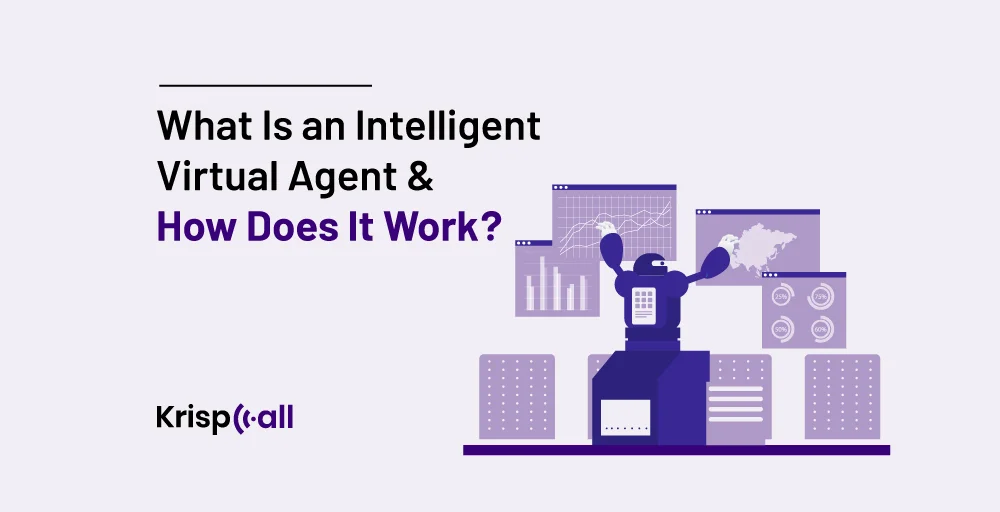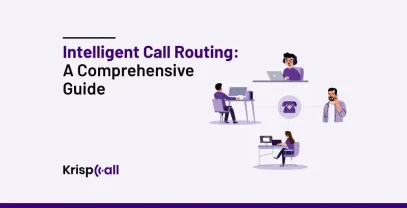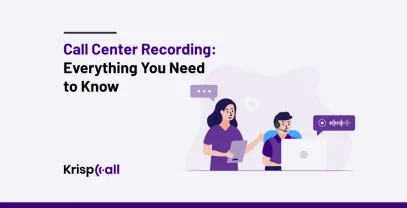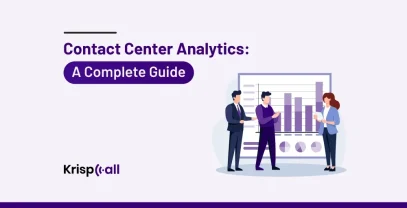Sometimes, customers get frustrated 😒 when they receive the same pre-defined answer repeatedly. They prefer humans to interact with their queries💬 rather than machines 🤖.
Delivering a human touch 🤏 in customer experience is challenging unless you use an Intelligent Virtual Agent (IVA).
With IVA technology, you can interact intelligently with your customers. IVA is sophisticated software that understands user requests, processes them, and provides appropriate responses like humans 🧍.
In this blog, you will learn about IVAs, their working mechanism, how they benefit businesses, and how they compare to other virtual assistants.
🔑 KEY HIGHLIGHTS
- IVA is an AI-powered software that uses ML, NLP, and AI to engage with users in a human-like interaction.
- Intelligent Virtual Assistants (IVAs) differ from other virtual assistants in terms of features, capabilities, and interaction style.
- Unlike other virtual assistants, Intelligent Virtual Agents (IVA) are more sophisticated software programmed to understand recurring human speech questions and resolve them intelligently, much like live agents.
- An IVA has many use cases, such as internal operations, customer service, and sales and marketing.
What Is An Intelligent Virtual Agent (IVA)?
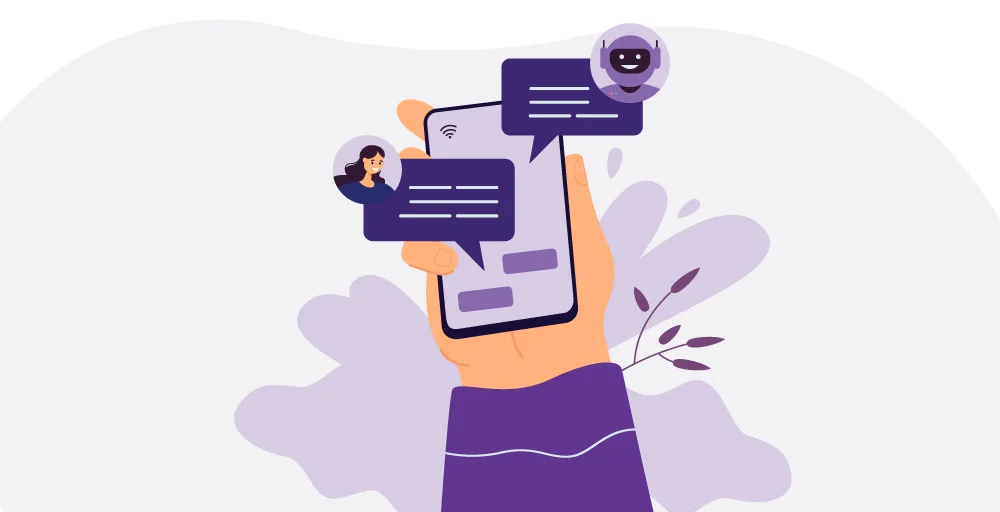
An Intelligent Virtual Agent (IVA), also known as an intelligent virtual assistant, is an AI-powered virtual agent that uses machine learning, natural language processing, and artificial intelligence to engage with users in a human-like interaction. IVA can understand and answer human speech like a real person, especially regarding simple and repetitive requests.
Intelligent Virtual Agents (IVA) are more sophisticated software programmed to understand recurring human speech questions and resolve them efficiently and intelligently, much like live agents.
IVAs can handle complex problems, such as scheduling appointments, raising support tickets, facilitating order placement, and troubleshooting common IT issues by examining multiple source data for AI conversations.
How Do Intelligent Virtual Agents Help Businesses?
Intelligent virtual agents offer various benefits to businesses. The benefits businesses can adopt from IVAs are:
- Enhance Customer Experience: IVA is an AI-powered software that uses machine learning, natural language processing, and artificial intelligence to offer a human-like experience to customers with instant solutions. IVA can handle tasks such as answering FAQs and routing inbound calls to particular agents to reduce customer wait times.
- 24/7 Availability: An intelligent Virtual Agent (IVA) can handle all your queries and repetitive requests and solve your issues all hours, day and night. Responding to all customer queries and providing support 24/7 helps to enhance business growth.
- Task Automation: With IVA, common business services can be executed automatically, such as making recommendations, setting reminders, scheduling appointments, and solving repetitive requests.
- Easy To Scale: IVA offers various features for businesses, irrespective of their customer base. Any business size can benefit from using IVA for repetitive tasks and supporting agents to manage a large number of queries.
- Offers Omnichannel Integration: IVA can integrate with various digital platforms, such as mobile apps, websites, SMS, and messaging.
How Do IVAs Work?
IVA uses various AI technologies to understand and assist users with their requests. The process of understanding a user request, processing it, and providing an appropriate response can be broken down into three steps:
- Natural Language Processing (NLP): In the first step, IVA uses NLP techniques to break down sentences using tokenization, stemming, and lemmatization to identify and understand the keywords used. A sentiment analysis is also performed here to determine the emotional tone of the query.
- Machine Learning (ML): Once the sentences are broken down into simpler terms, IVA uses machine learning algorithms. These allow IVA to strengthen its learning capabilities and try to identify patterns by analyzing past interactions. ML also helps IVA learn user preferences, improve response time, and personalize their requirements and responses accordingly.
- Generative and Conversational AI: Finally, based on NLP and ML, an IVA generates a human-like conversation without losing the tone of the situation using conversational AI. It understands the query, processes it through various AI technologies, and generates relevant responses more like a human.
Advantages of Using Intelligent Virtual Agent
Intelligent Virtual Agents offer various advantages that can be beneficial to organizations or businesses. The various benefits of IVA are:
- Enhanced Efficiency: IVA provides automation task facilities for repetitive requests such as scheduling appointments, reminders, FAQs, and basic information, reducing time and freeing up human resources for complex interactions.
- 24/7 Availability: IVA can handle all your repetitive requests and queries and resolve your issues all hours, day and night [24/7]. It provides support and responds to all customer queries.
- Improved Agent Productivity: It reduces agents’ time by automating day-to-day tasks, allowing agents to focus more on complex interactions, which helps to enhance their productivity.
- Scalability and Flexibility: IVA can be useful for businesses of any size as it can handle a large volume of queries. Businesses with any customer base can use IVA because it adapts to needs.
- Personalize Experience: Using NLP and ML, IVA can learn user preferences, tailor its response, and adapt to their needs. For example, an IVA can greet a customer by name, recommend products based on their past purchases, or provide targeted support based on their needs.
Virtual Agents Use Cases
Virtual agents have a wide range of use cases in various industries. Some of the most common use cases are:
- Internal Operations: It can streamline the employee onboarding process with essential information and resources and provide IT support, such as answering basic IT questions, resolving common issues, and providing ticket logs for queries or problems.
- Customer Service: IVA offers various features to enhance customer service. Virtual agents can answer frequently asked questions with automation, saving time and effort. Customers can also track their orders and troubleshoot basic issues independently. They offer live chat systems for answering simple queries.
- Sales and Marketing: It can aid in lead generation, qualify leads, and increase sales. It offers personalized recommendations to customer based on their preferences and past purchase history. Virtual agents can inform customers of special offers and ongoing promotions.
Virtual Agents Examples
There are different virtual agents you might have used in your day-to-day life. Below are the examples of common virtual agents examples:
- Chatbots: They are basic programs that provide answers based on input keywords and pre-defined rules. Chatbots are often used to answer simple queries like FAQs, but for more complex interactions, you need real agents.
- Voice Bots: It allows a caller to navigate conversation through natural language and voice commands, eliminating the need for buttons and menus. They are programmed with keyword input but do not necessarily use conversational AI.
- Interactive Voice Response (IVR): IVR systems are also a type of virtual agents. With a typical IVR system, keywords or voice input can be used to navigate to services. It directs repetitive requests such as FAQs and often-used services through per-recorded audio or text outputs.
- Intelligent Virtual Agents (IVA): An IVA is a much more sophisticated software programmed to understand recurring human speech questions and resolve them efficiently and intelligently. IVAs can handle complex problems, such as scheduling appointments, troubleshooting common IT issues, etc.
How Is IVA Different Than Other Virtual Assistants?
IVAs provide more advanced capabilities and features than regular virtual assistants. They offer similar human-like interactions, can perform complex tasks, and understand context. However, IVAs have advanced intelligence, capabilities, and interaction features compared to other virtual assistants.
On the one hand, IVAs leverage artificial intelligence to understand context and meaning. They can adapt their responses, ask clarifying questions, and even learn from interactions to improve future performance.
On the other, virtual assistants rely on programmed responses and struggle with complex requests or following the flow of a conversation. Additionally, virtual assistants are often limited to a single device and can only perform basic tasks within their programmed functionality.
How Do You Implement An Intelligent Virtual Agent?
Implementing virtual agents requires proper plans and a well-defined process. Here are the steps to implement an intelligent virtual agent:
- Choose an IVA software that is deemed right for your business.
- Define its purpose, clear goals, and use cases.
- Design effective conversation flow for user inquiries.
- To enhance understanding, train it with real data.
- Choose a platform for deployment and integration.
- Test and refine continuously.
How Is IVA Different From Chatbot?
AI chatbots and Intelligent Virtual Assistants (IVAs) are both tools that can automate conversations, but IVAs are a more advanced version.
IVAs utilize NLP and machine learning to understand the intent behind a user’s message. This allows them to handle more complex questions and carry on natural conversations in a chat-like interface. IVAs can handle more complex tasks like problem-solving, appointment scheduling, or even generating reports.
Conversely, Chatbots are simplistic tools that interact with inquirers and provide answers to their questions based on pre-defined criteria through a simple conversational user interface. Chatbots are designed for simple tasks like answering FAQs, collecting data, or routing users to the appropriate resources.
Conclusion
Intelligent Virtual Agents represent a significant advancement in AI-driven technology, offering businesses a powerful tool for improving customer service, streamlining operations, and enhancing user experience. In contrast to other virtual assistants, IVAs use ML, NLP, and AI to assist users personally, deliver in-depth insights, and deliver accurate results.
An IVA’s use can change how businesses interact with their customers initially and beyond. For that, they must opt to harness the power of an IVA and its capabilities to offer personalized assistance, streamline operations, and enhance the overall user experience.
FAQs
How are virtual agents different than virtual assistants?
Virtual agents are software that focuses on customer service and advanced capabilities such as understanding complex queries, adapting to conversation flow, and learning from interaction.
Virtual assistants are human agents who focus on personal support and are more involved in complex human interactions and problem-solving.
How can I get started with an intelligent virtual agent?
To get started with an intelligent virtual agent, follow those simple steps:
- Identify common customer queries.
- Choose an intelligent virtual agent provider.
- Train and test the agent.
- Deploy it.
- Regularly monitor its performance.
What types of businesses use IVA?
Businesses that want to acquire AI-powered software that engages with users in a human-like interaction can use IVA, irrespective of their customer base and business size.

